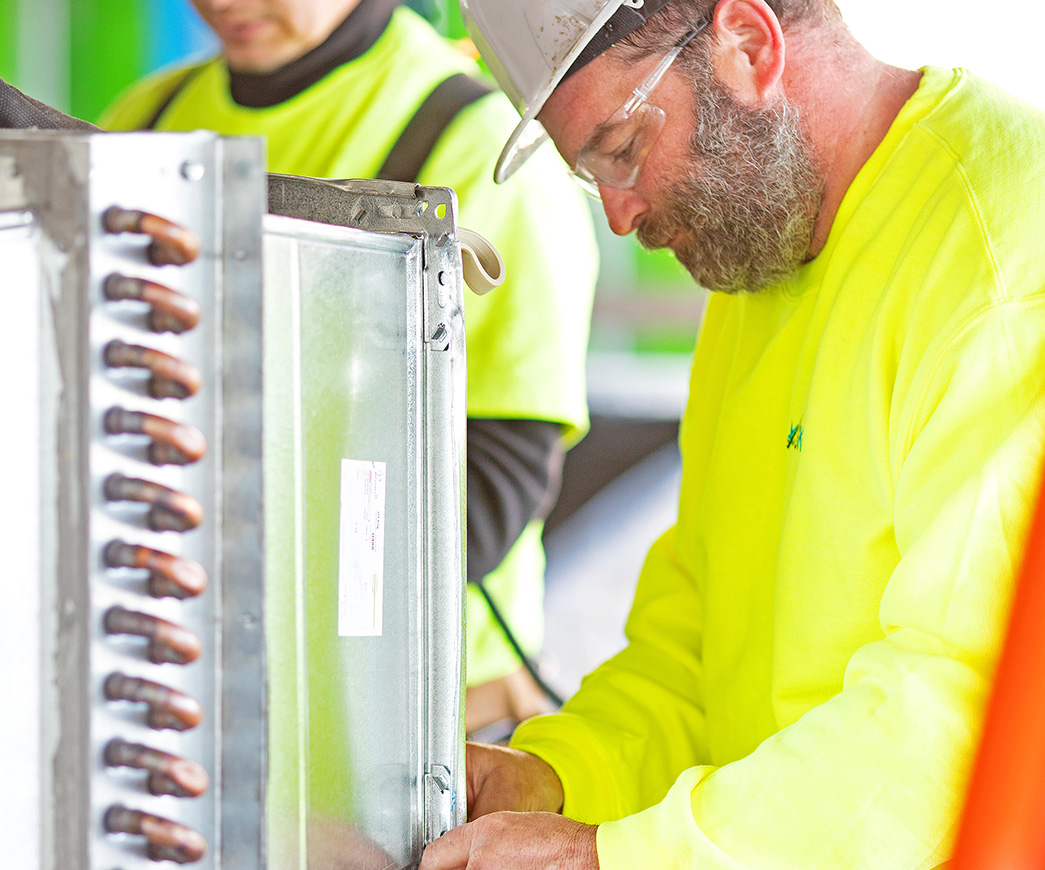As our promise to you, we’ll provide the resources you need to take your career as far as your hard work, dedication, and talent will carry you. Click or scroll below to learn more and see if SKMES is the right place for you!
Considering a career in construction?
Consistent Job Availability
Ability to Earn Money Quickly
Lifelong Career Advancements
Team Collaboration & Strong Networks
Constant Learning Opportunities
The Chance to Broaden Your Skill Set
The Chance to Express Your Creativity
The Chance to Help Build Communities
With benefits like these, you’ll find a rewarding career at SKMES.

Types of Construction Jobs
Electricians
Install, maintain, and repair electrical equipment like transformers, lighting systems, wiring, controls, intercom systems, and fixtures. Read blueprints and determine locations of circuits, panel boards, and more. Troubleshoot problems and ensure all work is up to code.
Electrical Helpers
Hold and supply the necessary materials or tools to electricians. Help clean work areas and equipment as needed. This position generally requires less knowledge of the trade.
HVAC Technicians
Install, inspect, or repair heating and air conditioning systems. Use blueprints to install electrical wiring and controls. Connect systems to fuel and water supply lines and air ducts. Test equipment to determine if repairs are necessary, and replace worn or defective parts as needed.
Tractor-Trailer Truck Drivers
Drive a tractor-trailer or truck with a gross vehicle weight of more than 26,000 pounds. Deliver supplies to and from job sites as needed. This position requires a commercial driver’s license. May be required to unload the truck.
Plumbers & Pipefitters
Assemble, install, and maintain pipes, pipe systems, supports, fittings, and fixtures or related equipment. Troubleshoot pipe systems and repair or replace parts as needed. Cut holes, hang steel supports, and measure and cut pipe using cutters and saws. Ensure piping is up to code. Soldering may be required.
Plumber & Pipefitter Helpers
Hold and supply the necessary materials or tools for plumbers and pipefitters. Help clean work areas and equipment as needed. This position generally requires less knowledge of the trade.
Millwrights
Install, take down, repair, and move equipment and machinery according to blueprint design. Adjust and align moving parts, and replace defective parts as needed.
Construction Equipment Operators
Operate equipment including graders, scrapers, bulldozers, backhoes, lifts, tractors, or front-end loaders. Move or place equipment and material. Inspect, refill, and clean equipment as needed.
Sheet Metal Workers
Fabricate, install, and repair sheet metal products such as duct and pipe. Set up and operate fabricating machines, saws, plasma cutters, and drills. Cut, bend, and straighten metal. Read blueprints and specifications, determine next steps, and ensure accuracy by meticulously measuring and cutting the material.
Welders
Use equipment to join metal components or fill holes and seams in metal products. Smooth and polish metal surfaces. Study blueprints and calculate dimensions. Inspect materials that need welding, monitor the process for overheating, and maintain welding machinery and equipment.
Apprentice
An apprentice learns a skill through both classroom instruction and supervised work on the job. Typically a 4-year program, apprentices will learn to use, handle, and care for tools of their particular trade.
Journeyman
A journeyman has already completed an apprenticeship and can work independently. They know how to use and care for their tools, and can perform any task their trade requires. They have the ability to get a journeyman’s license.
Project Manager
Project managers coordinate design and construction processes for multiple jobs. They interpret contracts and blueprints, write proposals, report progress, and handle any issues or delays. They work in-office and on-site with architects, contractors, trade workers, and government officials. They need to communicate well, prioritize deadlines and budgets, and understand construction methods, industry software, and technology. They must comply with codes, be able to explain technical information, and understand long workdays may be needed.
Foreman
A foreman typically has years of on-the-job experience and knows their craft inside-out. They are responsible for supervising every aspect of a job, from working directly with architects and contractors to management and labor departments. Foremen need to be strong leaders, effective communicators, engaged mentors, and ongoing teachers. They keep job sites safe, read blueprints, fill out paperwork, and ensure the job is done on time and within budget.
Superintendent
Superintendents oversee every phase of a project, from start to finish. They supervise the foreman, serve as manager upon a foreman’s absence, and work closely with architects, engineers, and other trade professionals like on-site labor workers. They maintain records, inspect and approve work, enforce rules and safety regulations, and approve time cards and time off. They may also be involved in budgeting and estimating from time to time.
Estimator
Estimators are responsible for determining the best price to win a job contract in a competitive bidding situation. They research materials and labor costs, get quotes from suppliers and subcontractors, access risk levels, prepare and submit quotes for work, and make sure that costs are kept in-line throughout the job. They need to know how to use estimating software and programs, be comfortable working in a team environment, and understand that occasional long workdays may be required.
